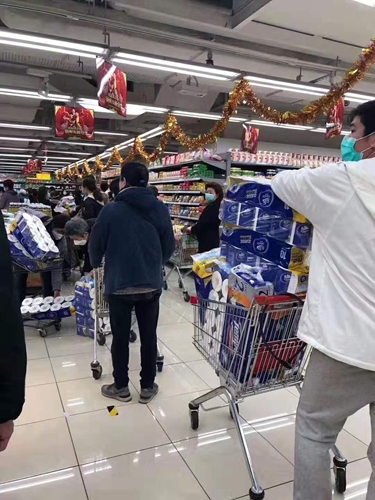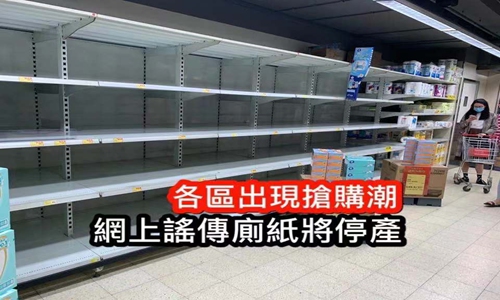HOME >> CHINA,SPECIAL-COVERAGE
Shutting mainland-HK border 'unwise'
By Yang Sheng Source:Global Times Published: 2020/2/6 20:08:43
Opposition forces use epidemic to push separatist agenda: analysts

Rumors on Hong Kong's social media networks said napkins and toilet rolls will stop production due to the novel coronavirus crisis and the closure of the Hong Kong-mainland border, which sparked panic buying in the city. Photo: screen shot of online video

Rumors on Hong Kong's social media networks said napkins and toilet rolls will stop production due to the novel coronavirus crisis and the closure of the Hong Kong-mainland border, which sparked panic buying in the city. Photo: screen shot of online video
As Hong Kong opposition groups and anti-government forces pressured the Hong Kong Special Administrative Region (HKSAR) government to fully close its border with the Chinese mainland, experts noted on Thursday that these forces are using the 2019-nCoV epidemic crisis to realize their political purpose - to separateHong Kong from the Chinese mainland.
HKSAR Chief Executive Carrie Lam has repeatedly dismissed demands for a full border closure, citing logistical and business reasons, and arguing it would be mostly Hong Kong residents who commute that would suffer, the South China Morning Post (SCMP) reported on Wednesday.
But some "transport and public policy experts" disputed this view while being interviewed by the SCMP, and have argued that Lam's decision was "political, not based on necessity and feasibility." According to rthk.hk on January 26, Wu Chi-Wai, chairman of the Hong Kong Democratic Party, a major party of the opposition camp, even said the People's Liberation Army Garrison in Hong Kong should open their compounds to quarantine the infected.
Li Xiaobing, an expert on Hong Kong, Macao and Taiwan studies at Nankai University in Tianjin, told the Global Times on Thursday that this kind of "ugly and poisoned" call shows that these opposition politicians are just using the epidemic crisis to realize their goal to separate Hong Kongfrom the mainland.
"They know very little about the coronavirus and just use the virus to create panic and hype anti-mainland sentiment. In 2003, while the SARS outbreak hit Hong Kong, there was no call in the mainland to shut down its border with the city, and the whole country made great efforts to help Hong Kong fight SARS and recover," Li said.
A Beijing-based expert in the field of epidemic prevention and control who requested anonymity said that "in the mainland, we just block the outbreak region, not every city. We just check every passenger and curb unnecessary travel."
"Shutting down the border is not a responsible and effective way to control the virus, and the World Health Organization has already said it is unnecessary to do so," said the expert.
On Monday, the HKSAR government shut all border crossings, except for the Hong Kong-Zhuhai-Macau Bridge, Shenzhen Bay Port, the international airport and the Kai Tak Cruise Terminal, the SCMP reported.
Among those closed were major land and sea crossings including the Lo Wu and Lok Ma Chau checkpoints, and the Hong Kong-Macau Ferry Terminal, which together accounted for about 60 percent of cross-border passenger traffic in 2018.
A full shutdown of the border will further hurt Hong Kong's economy which is already damaged by the months-long turmoil, and for an international city like Hong Kong, it is unrealistic to close its connections with the mainland, Li said.
"Due to the impact of the turmoil last year, the number of mainland visitors to Hong Kong was already reduced, and now the majority of the passengers between Hong Kong and the mainland are Hong Kong residents. So if a full shutdown is imposed, the victims are the Hong Kong people, and it would add more problems rather than ease the pressure," Li noted.
A HKSAR government source who didn't give his name told the SCMP that it would be difficult to handle the flow of goods if all borders were closed, especially with the system of health checks.
"Should we ask the driver to leave the truck at the border and ask another driver from Hong Kong to send the goods to the city instead?" the source asked.
Victor Chan, 34, a Hong Kong resident and vice chairman of the Hong Kong Association of Young Commentators, told the Global Times that the panic and rumors created by opposition group figures have caused the people to irrationally rush to purchase life necessities, such as napkins, at shopping malls and supermarkets, and this has brought new pressure to the city's economy.
A full shutdown will negatively impact Hong Kong people, Chan said. "For instance, I have a friend who is a manager of an enterprise that is deeply connected with the mainland market and he needs to travel to the mainland frequently for business, and if a full shutdown is imposed, his enterprise will be paralyzed and it would cause an unemployment problem."
"Many Hong Kong residents are working in Hong Kong but living in Shenzhen because of cheaper rent, and they travel between the two places every day. Have those people who pressure the government to close the border ever considered the impact to these people?" said Chan.
Posted in: SOCIETY